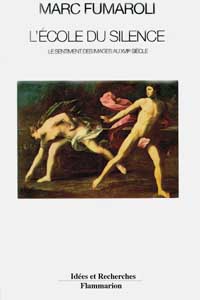Fumaroli wins Balzan literary prize
By Seth SandersNews Office
 |
Marc Fumaroli, Professor in Romance Languages & Literatures and the Committee on Social Thought, received the 2001 Balzan Prize for Literary History and Criticism (post 1500), at a ceremony on Friday, Nov. 9.
Comparable to a MacArthur fellowship in its prestige and generosity, but less well-known in the United States, four Balzan prizes are awarded annually, each totaling one million Swiss Francs (£400,000, U.S. $550,000), in recognition of outstanding international achievements in science and humanities.
Described by The Idler magazine as presenting “precisely the image Americans think of when they contemplate a French intellectual––gray, distinguished and immensely learned,” Fumaroli is general editor of the recent, monumental Histoire de la rhÈtorique dans l’Europe moderne, 1450-1950, (2000). The award presenters described Fumaroli as “a lively and provocative polemicist ever since, in L’tat culturel (1991), he criticized the State as a ‘guiding star of culture’ and culture itself as ‘the religion of modernity.’”
Fumaroli was born in Marseille, France, but was raised in Fez, Morocco, where he escaped the upheaval of World War II. Educated in classics, he taught at the University of Lille until 1976. He joined the faculty of the University of Paris IV, after receiving his doctorate in 1976.
In 1986, Fumaroli assumed the chair of Rhetoric and Society in Europe at the College de France. In 1989, he became�a�corresponding member of the British Academy.
He was awarded the Legion of Honor in 1993 and was elected to the French Academy in 1995.But Fumaroli has a special relationship with Chicago, which he characterizes as “one of the most remarkable academic institutions, not only in the States, but in general.” Fumaroli returns here each year from France to teach.
Over the past three decades, he has published more than a dozen books on topics that include Eloquence from the Classical period to the Renaissance; the fables of La Fontaine; the essays of Montaigne; the paintings of Poussin; the dramas of Corneille, a survey of the literature of the mid-17th century; and the School of Silence, L’Ècole du Silence, in an attempt to recover the historical experience of art in the 17th century.
His critique of the French Ministry of Culture, L’Etat Culturel: Essai Sur Une Religion Moderne (1992), caused a sensation on the occasion of its publication. While deeply involved in the thought of the Modern period, Fumaroli concurs with many critics of the Enlightenment, such as Eric Voegelin, Leo Strauss and the Frankfurt school.
The Enlightenment “invented a religion of Man, which is extremely seductive and at the same time extremely dangerous Ö elementary experience teaches you that Man is not a god, but on the contrary, Man is a very perilous creature. And so, to make an idol of Man, is to create a very, very dangerous religion.”
From the 1 million Swiss Francs prize total, the winner designates half the sum for further research work to be carried out, preferably by young researchers.
Unlike many international prizes, the Balzan Foundation Prize ranges across many disciplines. New categories are considered each year in both the humanities and sciences, ensuring that a broad range of subjects is covered.
Other winners this year are James Sloss Ackerman, professor emeritus at Harvard University, for work on the history of architecture (including town planning and landscape design); Jean Pierre Changeux of CollËge de France and of Institut Pasteur, for work on cognitive neurosciences; and Claude Lorius of CNRS in France, for work on climatology.
![[Chronicle]](/images/small-header.gif)